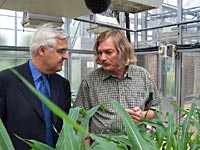Clermont-Ferrand, France
September, 2004
This editorial was published in
September 2004 on the website of
Limagrain
Reproduced with authorization from
Limagrain
On Friday September 10th, at
Biogemma in Clermont-Ferrand in France
SUPPORT AND RECOGNITION FROM
FRANCOIS D'AUBERT,
FRENCH MINISTER FOR RESEARCH
Political
responsibility has finally plucked up enough courage to
take real action. On Friday September 10th the French
Minister responsible for Research, François d’Aubert,
came to Clermont-Ferrand to meet the researchers from
Biogemma and to encourage them to keep their spirits up
after the destruction of the field trial in Marsat on
August 14th.
“Destroying a GMO plot is like forcing your way into a
laboratory with a crow bar to smash up test tubes,” he
declared. “It is the destruction of scientific and
intellectual research of public interest.”
The Minister set the tone for the day, spent first at
Biogemma, and then at INRA (National Institute for
Agronomic Research) in Clermont-Ferrand, continually
denouncing “those vandals who are barking up the wrong
tree, not even in the name of the principle of
precaution, but that of obscurantism.”
Speaking to researchers, François d’Aubert reassured
them that “the government and public authorities will
make sure the law is respected. GMO research must be
continued without being attacked. We will protect
laboratories in the widest sense of the term, whether in
fields, in greenhouses or indoors.”
The
Minister highlighted the fact that field trials run
within the framework of the strictest legislation are a
vital stage in research programmes. “Once it has gone
through the lab and the greenhouse, the plant has to
perform with real sun, soil and rain.” He also insisted
that, “transgenesis is an amazing tool, not only for
agriculture but also for the environment, since the use
of pesticides can be reduced, water can be saved, and
there are benefits for health.” |
 |
|
Meeting with researchers from BIOGEMMA in
Clermont-Ferrand |
 |
|
François D'AUBERT, French Minister for
Research and Alain TOPPAN, manager of field trials at
Biogemma. |
François
d’Aubert announced that he was determined to make research into
plant biotechnology a priority, and that funding of the
Genoplante programme, which Biogemma and public research both
participate in, would be guaranteed for five years.
Pascual Perez, the manager of the Biogemma laboratory in
Clermont-Ferrand, declared that “this straightforward of the
Minister are all seen as true recognition of our research. This
helps to provide the motivation necessary to continue our work
and field trials”.
LE
SOUTIEN ET LA RECONNAISSANCE DE FRANCOIS D’AUBERT, MINISTRE
DELEGUE A LA RECHERCHE
Cette
fois, la responsabilité politique a pris le pas sur la
frilosité. Vendredi 10 septembre, le ministre délégué à la
Recherche, François d’Aubert, s’est rendu à Clermont-Ferrand
pour rencontrer les chercheurs de Biogemma et les encourager à
tenir bon après la destruction, le 14 août, de l’essai au champ
de Marsat.
« Faucher une parcelle d’OGM, a-t-il déclaré, c’est comme
rentrer dans un laboratoire avec une barre à mine pour casser
des éprouvettes, c’est détruire une œuvre scientifique et
intellectuelle d’intérêt général.»
Le ton était donné par le ministre qui, tout au long de la
journée, chez Biogemma puis à l’INRA de Clermont-Ferrand, n’a
cessé de dénoncer « ces vandales qui mènent un combat de mauvais
aloi, qui ne relève même pas du principe de précaution mais de
l’obscurantisme.»
Face aux chercheurs, François d’Aubert a assuré que « le
gouvernement et les pouvoirs publics entendent faire respecter
la loi. La recherche sur les OGM doit pouvoir se faire dans la
sérénité. On protégera les laboratoires au sens large du terme,
c'est-à-dire en plein air, sous serre, et sous abri.»
Le ministre a souligné que les essais au champ, réalisés dans le
cadre d’une réglementation très stricte, sont une étape
obligatoire pour la recherche : « Une fois sortie du laboratoire
ou de la serre, la plante doit être confrontée à un vrai soleil,
à un vrai sol et à de la vraie pluie. » Il a également rappelé
que « la transgénèse est un outil extraordinaire non seulement
pour l’agriculture mais aussi pour l’environnement, en
permettant d’utiliser moins de pesticides, d’économiser l’eau,
mais aussi pour la santé ».
Déterminé, François d’Aubert a annoncé qu’il faisait de la
recherche en biotechnologies végétales une priorité et que le
programme Génoplante, auquel participent Biogemma et la
recherche publique, bénéficierait de financements garantis sur
cinq ans.
Pour Pascual Perez, directeur du laboratoire de Biogemma à
Clermont-Ferrand, « les déclarations du ministre sonnent comme
une véritable reconnaissance de nos recherches. Cela nous
confortera pour continuer nos travaux et nos expérimentations au
champ. »
Any reproduction, even
partial, using any media whatsoever, is forbidden without the
prior authorization of Limagrain. |